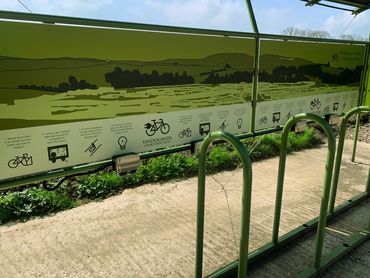powerPARK: Solar E-bike Charging and Bike Shelter at Historic Roman Fort Vindolanda

Riding on Sunshine at Vindolanda Roman Fort
A Heritage Site Committed to Sustainability
Vindolanda Roman Fort, a cornerstone of Hadrian’s Wall heritage, continues to reveal remarkable organic artefacts - writing tablets, leather shoes, textiles - thanks to waterlogged, anoxic peat soils. But now these preservation conditions are under serious strain.
Archaeologists warn that climate change is drying and cracking the peat, letting oxygen in and accelerating decay of organic material and that many artefacts may be lost before they can be excavated. In fact, one curator warns much of the buried archaeology could vanish within the next 15 years unless urgent action is taken.
The Challenge: Lowering Carbon While Protecting Heritage
Vindolanda wanted to strengthen its commitment to sustainability by encouraging more visitors to arrive via active, low-carbon travel, particularly by bike or e-bike. Any solution had to reduce car journeys, cut associated emissions, and support its Green Tourism goals, while fitting seamlessly into the unique needs of an active archaeological site and sensitive heritage landscape.
The Solution: powerPARK Solar-Powered E-Bike Charging Shelter
Installing a solar-powered, off-grid e-bike charging station offered the perfect answer: it promotes sustainable travel choices without the need for disruptive groundworks, heavy cabling, or a mains power supply, ensuring heritage protection while delivering a modern, visitor-friendly facility.
This station is part of the expanding Northumberland solar-powered e-bike charging network, featured in the Northumberland Gazette as a way to “cut carbon and boost tourism.”

We’ve travelled from Eastbourne and the hills around Hadrian’s Wall are really challenging! I know I can make it back to our campsite after charging up at the powerPARK here.
Ian & Stephanie at Vindolanda Roman Fort
Vindolanda: Saving the Past, Powered by Nature
By installing the powerPARK solar-powered e-bike charging and bike shelter, Vindolanda shows how even the most historic sites can embrace forward-looking solutions.
It’s a win for visitors, the environment, and the heritage sector, inviting everyone to explore, connect, and enjoy Riding on Sunshine in the beautiful Northumberland countryside.


.png/:/cr=t:5.6%25,l:0%25,w:100%25,h:88.81%25/rs=w:515,h:234,cg:true)
Find Funding Faster
Get weekly tailored funding matches delivered straight to your inbox.
Let the right funding come to you.
